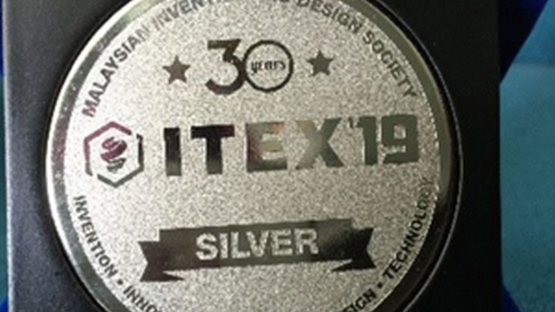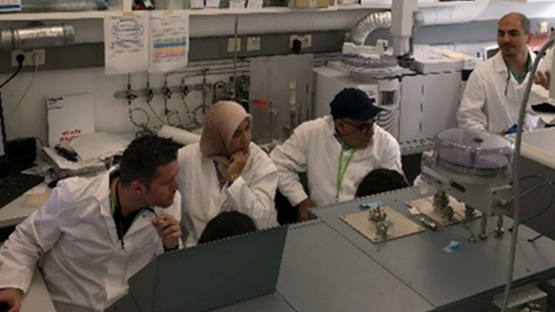Edible bird’s nest ranks among the world’s most expensive animal products for food and medicinal uses, providing strong economic motivation for its adulteration and mislabelling of origin. Through participation in both research and capacity building of IAEA projects, including training on the development and application of analytical techniques in FEPL, Malaysia has introduced effective testing for control of their high-quality edible bird’s nest products to help protect this important market. The research activities of the Malaysian scientists, in collaboration with FEPL, were recognised at the 30th International Invention, Innovation and Technology Exhibition held in Kuala Lumpur in May 2019. The award of the silver medal for the ‘Site-Trace of Malaysian Edible Bird’s Nest’ project.

If you would like to learn more about the IAEA’s work, sign up for our weekly updates containing our most important news, multimedia and more.
Improved Food Safety and Security through Food Authenticity and Traceability Testing in Member States
Food safety is of paramount importance to protect the health of consumers and to help ensure food security.
In many countries people’s health and livelihoods depend on food production and food exports are often a major contributor to the economy. Ensuring that food is safe, authentic and of good quality is, therefore, vital both domestically and for international trade. An important challenge to the food supply that has emerged over recent years and has become a major problem globally is food fraud, the substitution of authentic foods or food components with cheaper, unknown and potentially dangerous adulterants.
The socio-economic impacts of food fraud are difficult to quantify, but clearly present significant challenges to attaining the UN Strategic Development Goals. Food fraud threatens the delivery of safe and sustainable food supplies, which undermines progress toward the sustainable development goal of zero hunger (SDG2). Illicit trade in agri-foods and food fraud also undermine ‘robust and resilient’ agricultural markets that support economic development and poverty reduction, hitting SDG1 ‘no poverty’, and increases the risk of exposing consumers to harmful ingredients or diluting active beneficial ingredients, threatening SDG3 ‘good health and wellbeing’.
Food fraud is estimated to cost the global food industry US$ 10-15 billion per year (IFIS, 2016), though some estimates are significantly higher - the World Customs Organisation estimate in 2004 was US$ 50 billion. While many incidents of illegal agri-food activity are associated with economic, environmental and sustainability losses, there are equally as many instances where food fraud has had disastrous effects on health and well-being (SDG 3).
Over the past decade, the Food and Environmental Protection subprogramme of the Joint FAO/IAEA Programme on Nuclear Techniques in Food and Agriculture has responded to increased Member States’ demands to improve their capabilities to deal with issues such as food fraud and food authenticity. Research has been carried out in the Joint Centre’s Food and Environmental Protection Laboratory (FEPL) and through coordinated research with laboratories in Member States, with the goal of developing analytical methods for food authentication that can be incorporated into food control systems to strengthen food safety and security and protect consumers and industry from health risks and fraudulent practices.
To effectively respond to these increasingly challenging threats to the integrity of Member States’ food supplies, the results of research into nuclear and related techniques must be useable and integrated in to food control systems. Generally, it is difficult to translate the results of the research into actual applications in the food supply chain and to visualise their impact. However, the innovative approaches of FEPL in this field have been of concrete benefit to more than 25 countries to date and the methodology continues to be further developed and refined, its scope broadened, and taken up and applied by other countries. Impacts include the integration of nuclear, isotopic and related methodology into food control systems, food quality schemes and regulatory standards; bringing food testing capabilities closer to the field with rapid and simple screening methods; forging of important links between research and industry with respect to geographical origin traceability and authenticity; building awareness of the issues related to food fraud and the role of nuclear techniques in controlling the problems, and baselining data on food fraud and its control to facilitate targeted research and capacity building. Some specific examples follow:
Nuclear techniques help strengthen food authenticity control in China
Through the support of the FEPL in CRP D52038, “Accessible Technologies for the Verification of Origin of Dairy Products”, stable isotope, trace element (SITE) and nuclear magnetic resonance (NMR) profiling methods have been developed to confirm the authenticity of milk, honey, chicken pigmentation and Longjing tea (GI). China has many inspection centres which take responsibility for quality control of different agro-food products. As a result of CRP activities, honey and Longjing Tea now have National Standards based on stable isotopes and multi-elements, which will be applied in the national testing centres. Currently the other stable isotope-based methods for milk and chicken have been submitted as Chinese patent applications, which are open to public scrutiny.
Stable isotope and trace element (SITE) analysis used to Slovenian milk origin in retail markets
A three-year project carried out by the Slovenian Ministry of Agriculture, Forestry and Food, with the support of the FEPL during CRP D52038, under the slogan "Our super food" began in 2016. The aim was to promote and raise awareness of the importance and characteristics of locally produced and processed foods. To help consumers to easily recognize local quality products, the “Selected Quality” national scheme and the “Selected Quality - Slovenia” protective mark were established. The Slovenian milk SITE database developed in the CRP was used to conduct surveillance of the origin of retail milk sold in Slovenia. This research is being applied to control Slovenian milk in a real-world application and has also been used to verify the authenticity of fruit juices on the Slovenian market. Currently the technology is being transferred to high value truffles, fruits and vegetables.
First prosecution for fraudulent adulteration of manuka honey in New Zealand
In 2019, methodology for stable-isotope analysis developed in the FEPL was used to support the first successful prosecution of a major honey producer in New Zealand for adding a synthetic version of a naturally occurring substance to its manuka honey products to fraudulently increase their value. Further method validation is now under way to roll out the test industry-wide in New Zealand, and potentially elsewhere.
Innovation award for quality control of edible bird’s nest in Malaysia

The ITEX2019 Silver Medal awarded to the Malaysian team for innovation in edible bird's nest quality control
Improved national capacity to control the use of recycled palm oil in Malaysia
With assistance and leverage offered by the FEPL and participation in CRP D52040, a collaborative research group has been established between industry stakeholders (Sime Darby Corporation) a Government agency (Malaysian Palm Oil Board (MPOB)) and the CRP research group. Information was gathered and collated on the different qualities and grades of palm oil as well as procurement of authentic palm oil and its by-products. The establishment of verified and authentic sources of industrial palm oils is essential and fundamental to effective control; having these stakeholders involved demonstrates both the credibility and importance of the work. A spin off project is currently in progress due to interests shown by Malaysian Palm Oil Board’s Metabolomics Unit in nuclear and nuclear-related techniques to help map the geographical origin of crude palm oils. This is another key issue related to the palm oil industry in Asia in addition to quality and authenticity concerns.
Testing milk product imports in Singapore to confirm origin
Singapore relies heavily on imports to meet their food supply requirements. At present, the tracing of the origin of food is very much dependent on the documentation that accompanies the imported consignment, which can be falsified or changed. Recognising Singapore’s vulnerability to food safety incidents given their heavy reliance on imports to meet food supply requirements, the Agri-Food and Veterinary Authority of Singapore (AVA), serving as the national food safety authority, initiated a traceability team in 2013 to build up their capacity in developing the necessary skills and expertise in nuclear techniques to support food traceability systems. At the end of the five-year CRP with the help of FEPL, techniques to analyse dairy milk for stable isotope signatures and element profiles have been set up and are well documented in standard operating procedures. This has enabled AVA to use statistical models to differentiate milk from six countries – Australia, Indonesia, Malaysia, New Zealand, Thailand and the United States, demonstrated through anonymised sample testing.
Enhanced technical capacity for food authenticity and the control of dairy products
It is of utmost importance to build the capabilities in Member States to perform research to tackle emerging and future problems with respect to food fraud and food authenticity. The coordinated research project “Accessible Technologies for the Verification of Origin of Dairy Products” (D52038) concluded in 2018. Over the 5 years of the project the 10 research contract holder Member States (Argentina, Bangladesh, China, Lithuania, Morocco, Poland, Russia, Singapore, Slovenia, Sri Lanka) generated 27 scientific publications in local and international journals; gave 21 oral communications related to the project; presented 23 poster communications; supported 8 PhD, 8 Masters and 4 Undergraduate students; trained 28 personnel; formed 10 new links to respective national dairy industries and 14 new academic links; generated 19 in-house standard operating procedures; and hosted 3 related workshops. The CRP has facilitated considerable further investment by the Member States in SITE capabilities and helped leverage and secure new national funding.
Research and Development in FEPL
In addition to coordinating the research that lead to these results, the FEPL supported and contributed to the work through research and method development activities. Some of the analytical method development work carried out in the FEPL at Seibersdorf included:
a. Development of a rapid and simplified method to detect the economically motivated adulteration of fruit juices and honey with undeclared addition of sugars and sugar-syrups using δ2H of non-exchangeable hydrogen by GC-CR-IRMS.
b. Bulk sulphur stable isotope analysis of authentic Malaysian Edible Bird’s Nests to confirm geographical origin.
c. Rapid screening methods to detect adulterants in milk and vegetable oils by IR and Raman spectroscopy (in milk - formaldehyde, H2O2, starch, boric acid, water and melamine; in argan and extra-virgin olive oil – sunflower and rapeseed oil adulterants).
d. Bulk carbon and nitrogen stable isotope of Sri-Lankan milk powders to confirm geographical origin.
e. Untargeted and targeted metabolomics methods to discriminate/authenticate fruit juices from India, South Africa and Spain and for the geographical and botanical origin of honeys.
f. Development of quality control materials to evaluate and harmonise analytical method performance in Member State laboratories.
Support for the application and development of international standards
The FEPL contributed to the publication of three recent Scientific Opinions (SO) through participation in the EU 7th Framework Integrated Project “FoodIntegrity: Ensuring the Integrity of the European food chain”:
SO1: Stable isotope techniques for verifying the declared geographical origin of food in legal cases;
SO3A: What are the scientific challenges in moving from targeted to non-targeted methods for food fraud testing and how can they be addressed? – Spectroscopy case study;
SO3B: The scientific challenges in moving from targeted to non-targeted mass spectrometric methods for food fraud analysis: A proposed validation workflow to bring about a harmonized approach.
The FEPL also contributed to the formulation of the European Committee for Standardization (CEN) Workshop Agreement CWA 17369:2019 “Authenticity and fraud in the feed and food chain – Concepts, terms, and definitions”. This is an important food authenticity terminology standard that should eventually become a full ISO standard.
Research and capacity building are ongoing and will continue in the foreseeable future to tackle emerging challenges and meet Member State demands in the field of analytical method application for food authenticity and to support food traceability systems.


